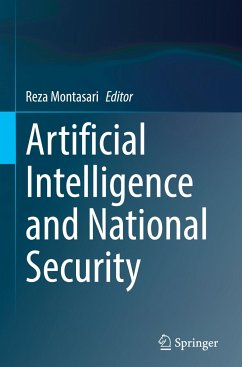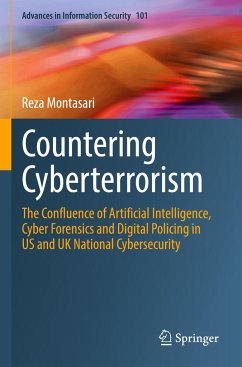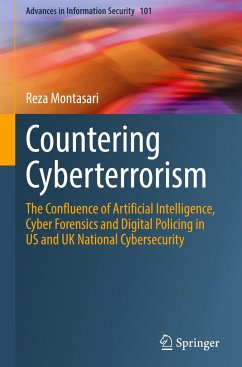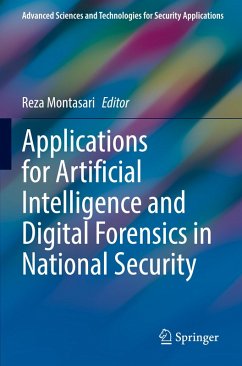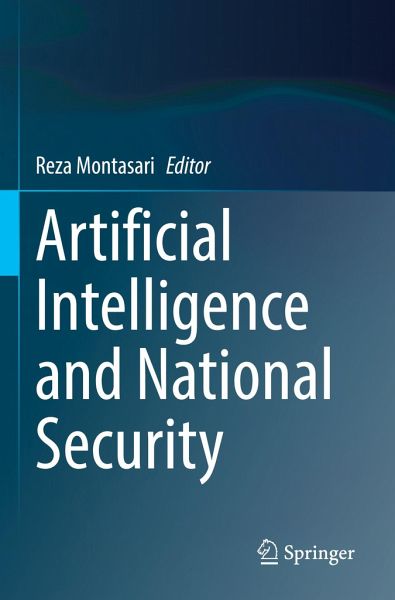
Artificial Intelligence and National Security
Versandkostenfrei!
Versandfertig in 6-10 Tagen
83,99 €
inkl. MwSt.

PAYBACK Punkte
42 °P sammeln!
This book analyses the implications of the technical, legal, ethical and privacy challenges as well as challenges for human rights and civil liberties regarding Artificial Intelligence (AI) and National Security. It also offers solutions that can be adopted to mitigate or eradicate these challenges wherever possible.As a general-purpose, dual-use technology, AI can be deployed for both good and evil. The use of AI is increasingly becoming of paramount importance to the government's mission to keep their nations safe. However, the design, development and use of AI for national security poses a ...
This book analyses the implications of the technical, legal, ethical and privacy challenges as well as challenges for human rights and civil liberties regarding Artificial Intelligence (AI) and National Security. It also offers solutions that can be adopted to mitigate or eradicate these challenges wherever possible.
As a general-purpose, dual-use technology, AI can be deployed for both good and evil. The use of AI is increasingly becoming of paramount importance to the government's mission to keep their nations safe. However, the design, development and use of AI for national security poses a wide range of legal, ethical, moral and privacy challenges. This book explores national security uses for Artificial Intelligence (AI) in Western Democracies and its malicious use. This book also investigates the legal, political, ethical, moral, privacy and human rights implications of the national security uses of AI in the aforementioned democracies. It illustrates how AI for nationalsecurity purposes could threaten most individual fundamental rights, and how the use of AI in digital policing could undermine user human rights and privacy.
In relation to its examination of the adversarial uses of AI, this book discusses how certain countries utilise AI to launch disinformation attacks by automating the creation of false or misleading information to subvert public discourse. With regards to the potential of AI for national security purposes, this book investigates how AI could be utilized in content moderation to counter violent extremism on social media platforms. It also discusses the current practices in using AI in managing Big Data Analytics demands.
This book provides a reference point for researchers and advanced-level students studying or working in the fields of Cyber Security, Artificial Intelligence, Social Sciences, Network Security as well as Law and Criminology. Professionals working within these related fields and law enforcement employees will also find this book valuable as a reference.
As a general-purpose, dual-use technology, AI can be deployed for both good and evil. The use of AI is increasingly becoming of paramount importance to the government's mission to keep their nations safe. However, the design, development and use of AI for national security poses a wide range of legal, ethical, moral and privacy challenges. This book explores national security uses for Artificial Intelligence (AI) in Western Democracies and its malicious use. This book also investigates the legal, political, ethical, moral, privacy and human rights implications of the national security uses of AI in the aforementioned democracies. It illustrates how AI for nationalsecurity purposes could threaten most individual fundamental rights, and how the use of AI in digital policing could undermine user human rights and privacy.
In relation to its examination of the adversarial uses of AI, this book discusses how certain countries utilise AI to launch disinformation attacks by automating the creation of false or misleading information to subvert public discourse. With regards to the potential of AI for national security purposes, this book investigates how AI could be utilized in content moderation to counter violent extremism on social media platforms. It also discusses the current practices in using AI in managing Big Data Analytics demands.
This book provides a reference point for researchers and advanced-level students studying or working in the fields of Cyber Security, Artificial Intelligence, Social Sciences, Network Security as well as Law and Criminology. Professionals working within these related fields and law enforcement employees will also find this book valuable as a reference.





